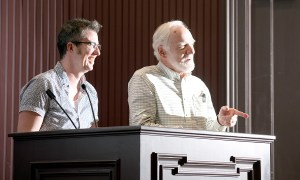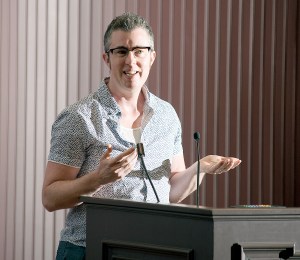LEWISTON — Sean Dorsey of San Francisco introduced himself to Thursday’s Great Falls Forum audience as “a different kind of dance maker.”
Recognized as the nation’s first acclaimed transgender modern dance choreographer, he creates modern dance that’s easily understood, dance that’s fused with the voices of real people’s stories.
An artist in residence at Bates College this month, he told his Lewiston Public Library audience that he’s queer-identified, was raised as a girl and transitioned to a male.
“I’m a history nerd. I root my work in stories,” he said. “A lot of LGBTQ history is left out, not taught, especially for trans and queer people. Many of us are excommunicated from our families.”
He has recently completed a trilogy of three works unearthing LGBTQ (lesbian, gay, bisexual, transgender, queer) histories through research, diaries and interviews.
The first is “Uncovered: the Diary Project,” a dance theater work based on reading people’s diaries, their histories often not passed on by families.
In that work is the story of Lou Sullivan of San Francisco, who was born in 1951 and died in 1991 from complications of AIDs.
“Google him,” Dorsey told his audience. Dorsey spent a year reading and transcribing Sullivan’s diaries.
“He was a huge transgender activist,” he said. “He was born as a girl, given a girl’s name,” transitioned through hormones and surgeries. “He came out as a transgender gay man.”
When he got sick, he was among the first to get through to the medical community that gender identification and sexual orientation were different things, Dorsey said.
In a film showing the dance Dorsey choreographed about Sullivan, dancers acted out the story as Sullivan’s diary was read.
His second project is “The Secret History of Love.” For that he interviewed older people, asking them to tell him of their first crushes, their great loves.
“I was interested in stories of trans and LGBTQ love,” how they managed to find each other during such a time of repression.
It was an era when people were arrested for what they wore, who they loved, a time of police raids on house parties and gay bars.
In one Boston gay bar, “they had one jukebox of country and western, another for cool music. When the cops were coming they’d put on country and western,” Dorsey said. “All the gay men would grab the lesbians and dance together so they wouldn’t get arrested. Parallel to this, trans people had zero rights.”
Despite being “scared to death” of being jailed and ridiculed, there was love.
Dorsey’s third piece is “The Missing Generation” about people who died from AIDs and their survivors.
“There’s an entire generation of people living amongst us with intense buried trauma who experienced mass grief that no one could understand,” Dorsey said.
Today, young audiences “don’t know what ‘ACT UP’ was, let alone that many people would get sick and die over the course of a weekend.”
It was during the Reagan administration, a time before AIDs tests or treatment. Reagan ignored the problem and there was widespread fear and mistreatment.
“In California, there were enough signatures gathered that it went for a vote to round up people diagnosed with HIV and put them in a camp,” Dorsey said. “Trans women were decimated by the early epidemic just as much.”
As he played the film of dancers acting out stories, one was of a man dying, skin and bones on a respirator. He said to another man, “I can’t go on like this. Just carry me up to the roof and throw me over. I’m 80 pounds. You’re strong.”
The man responded, through tears, that he could not do that.
While work has been done for the gay community, more must be done to help those struggling with gender, Dorsey said.
He gives dance workshops for the LGBTQ community, especially trans people. “Most never set a foot in a gym, a dance studio, yoga. It’s way too scary. It’s not safe.”


Comments are no longer available on this story